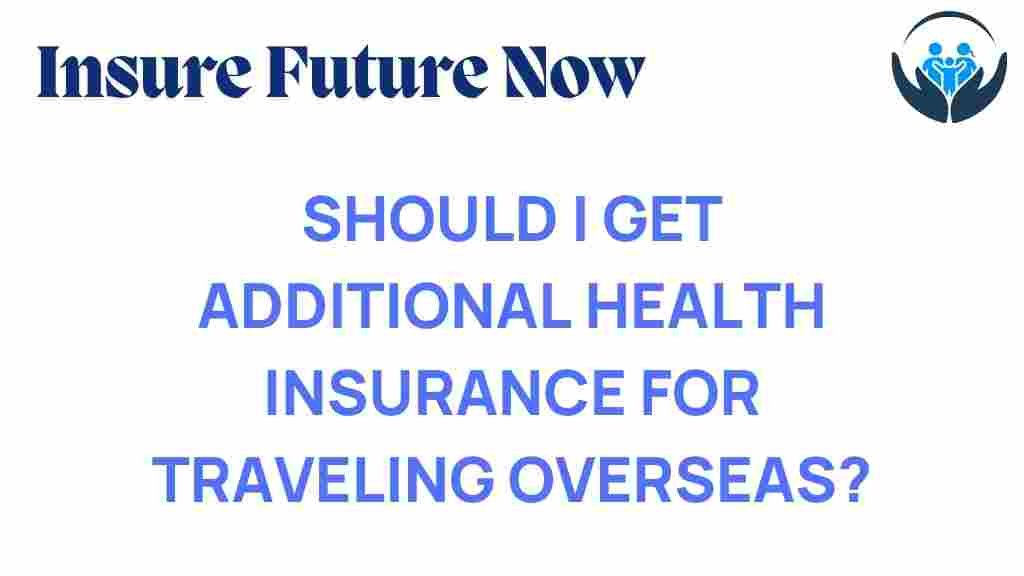Should You Consider Extra Travel Health Insurance for Your Next Adventure?
Traveling abroad can be one of the most exhilarating experiences of your life. However, it also comes with its fair share of risks, especially when it comes to health-related issues. This is why travel health insurance is an essential part of your trip planning process. Whether you’re heading to a bustling city or a remote tropical destination, the question remains: should you consider additional coverage for your overseas travel? This article will delve into the importance of travel health insurance, the types of coverage available, and tips to keep you safe during your adventures.
Understanding Travel Health Insurance
Travel health insurance is a type of insurance specifically designed to cover medical expenses and emergencies that may arise while you are traveling outside your home country. It can provide peace of mind, knowing that you are protected against unforeseen medical mishaps.
Here are some key points to understand about travel health insurance:
- Coverage for Medical Expenses: This includes hospital stays, doctor visits, and emergency medical evacuations.
- Emergency Assistance: Many policies offer 24/7 assistance services to help you find medical facilities or arrange for transportation.
- Trip Interruption: If you need to return home due to a medical emergency, this coverage can help recover lost costs.
Why You Need Additional Coverage
While many travelers rely on their domestic health insurance, it often falls short when it comes to overseas travel. Here are a few reasons to consider getting additional coverage:
- Limited Coverage: Domestic insurance may not cover international medical expenses or may have significant limitations.
- High Medical Costs: Healthcare costs can be exorbitant in certain countries, and without insurance, you could face substantial bills.
- Emergency Evacuations: If you require evacuation to a facility that can provide adequate care, the costs can be astronomical without insurance.
Types of Additional Coverage
When looking into travel health insurance, consider the following types of additional coverage that can enhance your travel safety:
- Trip Cancellation Insurance: This protects your investment by reimbursing you for non-refundable expenses if you have to cancel your trip.
- Baggage Insurance: Covers lost, stolen, or damaged luggage, providing peace of mind in case of travel mishaps.
- Accidental Death and Dismemberment Insurance: Offers benefits in the event of a serious injury or death while traveling.
How to Choose the Right Plan
Selecting the right travel health insurance plan involves several steps. Here’s a guide to help you navigate through the options:
Step 1: Assess Your Needs
Consider your destination, the activities you plan to engage in, and your current health status. If you’re embarking on an adventure trip that includes activities like hiking, skiing, or scuba diving, you may need a policy that covers sports-related injuries.
Step 2: Compare Policies
Not all insurance policies are created equal. Use comparison websites to evaluate different plans based on:
- Coverage limits
- Deductibles
- Exclusions
- Customer reviews
Step 3: Understand the Fine Print
Carefully read the terms and conditions of any policy you consider. Pay close attention to:
- Exclusions, such as pre-existing conditions or certain activities
- Claim processes and documentation requirements
- Emergency assistance services offered
Step 4: Calculate Your Budget
Travel health insurance should fit within your overall trip budget. Compare the cost of coverage against the potential costs of medical emergencies to make an informed decision.
Step 5: Purchase Early
It’s wise to purchase your insurance as soon as you book your trip. Some policies offer additional benefits, such as coverage for trip cancellations, if purchased promptly.
Travel Insurance Tips for Safe Adventures
To help you stay safe and make the most of your overseas travel, consider the following insurance tips:
- Carry Documentation: Always have a copy of your insurance policy, including emergency contact numbers, when you travel.
- Inform Your Doctor: If you have pre-existing conditions, inform your healthcare provider and check if they are covered abroad.
- Stay Updated: Research the healthcare system in your destination country and know where to seek help if needed.
What to Do in Case of a Medical Emergency
In the unfortunate event that you need to use your travel health insurance, follow these troubleshooting tips:
Step 1: Seek Medical Attention
Your health should always be your top priority. Find the nearest medical facility and seek help.
Step 2: Contact Your Insurance Provider
Notify your insurance company about your situation. They can guide you on next steps, including which facilities are covered under your policy.
Step 3: Keep Records
Document everything related to your medical issue, including:
- Receipts for services rendered
- Medical reports
- Any correspondence with your insurance company
Step 4: File a Claim
Once you are stable, file a claim with your insurance provider. Include all relevant documentation to support your case.
Conclusion
In summary, considering extra travel health insurance for your next adventure is a wise decision. It provides essential protection against the unexpected, ensuring that you can focus on enjoying your trip rather than worrying about potential medical emergencies. By assessing your needs, comparing plans, and understanding your coverage, you can travel with confidence. Remember, safety should always come first, so take the necessary steps to safeguard your health while traveling. For more tips on travel safety and planning, check out our [comprehensive travel guide](#) for additional resources. Safe travels!
This article is in the category Tips and created by InsureFutureNow Team
